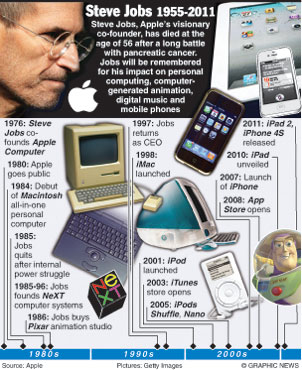I never really 'got' Apple. Like millions I always found the almost religious devotion to Apple's stylish but often infuriating machines off-putting and slightly creepy. I was forced to work on an Apple Mac for a while in the late 1990s and when we switched to PCs it felt like a liberation.
But I am in a small minority and I fully admit that with the death of Steve Jobs we have lost a talented genius whose trick was to make computers desirable for people who hated computers.
To me the computer has always been just a tool. But for millions the Apple Macintosh and its dozens of spin-offs and descendants are far more than that. They are part of their lives, they are part of who they think they are. Hardly anyone else has pulled off this trick with technology and for this Jobs deserves the tributes streaming in today.
Steve Jobs did not invent the personal computer nor did he invent clever user-friendly software. He did not invent the mouse, Windows-type interfaces nor all the paraphernalia of the modern IT world.
What he did instead was bring together the best of cutting-edge technology and packaged them brilliantly in ready-to-go boxes that any idiot could turn on and start working.
We forget now just how desperately awful computers were in the late 1970s. A popular model at the time, made by Tandy, had to be soldered together, had no casing, no monitor, no mouse and a keyboard with about six buttons. To make the thing do anything useful you had to have a degree in high-level geekery and be willing to spend hours programming the thing in machine code often as not to be rewarded with just a flashing green cursor.
Then in 1976 Steve Jobs founded a new company called Apple. The young company struggled in the early years coming up with computers like the Lisa and the first Macintoshes. The Apple and Apple II were self-contained stand-alone machines with a keyboard, a nice box and a monitor screen on top. Against today's machines they were basic beyond belief but compared to the opposition at the time it was like the 21st century had arrived early.
Throughout the Eighties and Nineties Apple's computers became more and more sophisticated and were machines of choice for creative types such as artists, writers and designers.
Steve Jobs was actually fired from Apple for a period in the late 1980s and during this time he bought another company which became Pixar, now the maker of hugely successful computer-generated movies such as Toy Story. Jobs returned to Apple in 1996 and rapidly brought it back to profitability.
For the last 20 years the 'narrative' has been that Apple is a cuddly, friendly company that sells nice computers to nice people and is run by a hippy-dippy guy who really isn't that interested in money.
Microsoft, on the other hand headed by the arch geek Bill Gates is seen as a cut-throat, rapacious firm which makes cheap but unreliable machines for unimaginative business people and programmers.
There are grains of truth in these cliches but only grains. Jobs, like Gates was first and foremost a fantastically successful businessman. There is no reason to doubt Gates's heartfelt tributes to his old rival today are anything but genuine. Far more united these men, and their companies than divided them.
What turned Apple from being a middling also-ran competitor to the biggest software company in the world was the undeniably brilliant 'i' range of products, starting with the iMac back in 1998.
Suddenly a new world of computing and entertainment was opened up to a whole new customer base. Younger, savvier more sociable and above all more female than the computer's traditional market.
The iPod begat the iPhone. Again, it was neither the only nor necessarily the best of its type on sale but, certainly somehow the most desirable.
Finally we have the iPad, a machine, which in my view had no right to succeed, yet which has probably surpassed its makers' wildest dreams.
Like all the greatest innovators Jobs did not respond to what people wanted; he made things that they didn't even know they wanted and then made them want them.
He took computing and the whole business of the electronic transfer and storage of information out of the world of the geek and the adolescent's bedroom and brought it into the mainstream.
For this he will be remembered as one of the key architects of the 21st century, as people like me who never quite 'bought' the Apple brand have to accept that we simply never caught the right wave. We shall not see his like again. |


